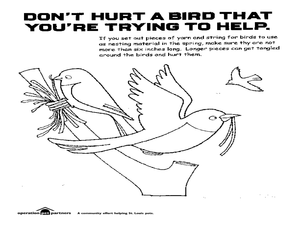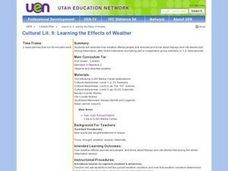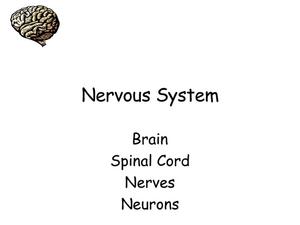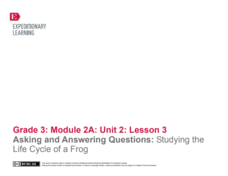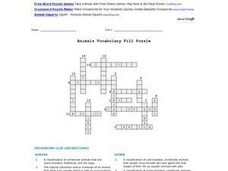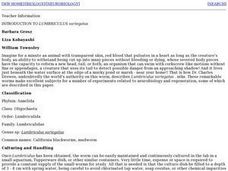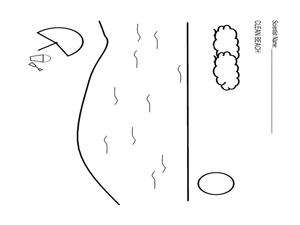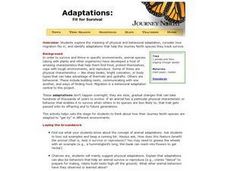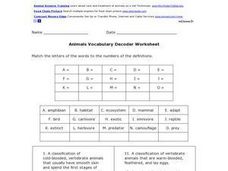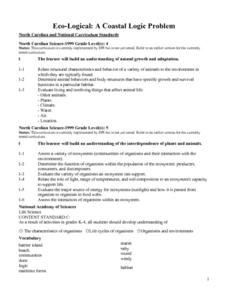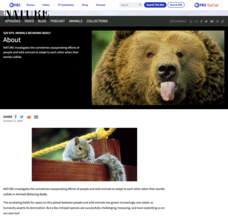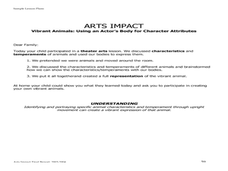Curated OER
Snug as a Bug
Pupils investigate survival strategies. In this survival strategies lesson, students study survival strategies used by animals. Using a seed to represent a bug, pupils create a safe home for their "seed-bug".
Curated OER
This is for the Birds!
Students complete activities to investigate wild birds. In this bird study lesson, students make a wild bird feeder to examine the proper ways to care for wild birds. Students explore organizations in their community that help wild birds...
Curated OER
Animal Movement
Students participate in a movement to music activity. In this awareness of movement lesson, students hear music and move like animals they hear described in the music. Students make disciplined movements and make sounds like animals.
Consortium for Ocean Science Exploration and Engagement (COSEE)
Arctic Smorgasbord
Though the walrus spends roughly one third of its time on land, it eats organisms that live on the bottom of the ocean. The first in a series of five, the lesson plan uses a variety of plant and animal cards to have scholars build an...
Curated OER
Stimulus Response
Students explore the five steps in the stimulus-response pathway. They analyze the senses and the difference between animals' primary and secondary senses. Students collect information about animal behavior to debate the ethics of...
Curated OER
Build Your Own Insect Trap
Students ask testable questions. They explain the relationship between insect behavior and insect trapping techniques. Students design their own insect traps to collect a new unknown insect, in the same way that entomologists collect the...
Curated OER
Learning the Effects of Weather
Second graders examine how weather affects animals and people. They discuss Navajo and Ute stories told during different seasons of the year, and create a drawing of people or animal behavior and the connection to the weather.
Curated OER
Nervous System
After reading through this presentation about nerve impulses, students should be able to complete the sentences given with the correct terms and scientific vocabulary. The basics of the ion channel behavior are detailed along with a...
EngageNY
Asking and Answering Questions: Studying the Life Cycle of a Frog
A lesson challenges learners to ask and answer questions about the life cycle of a frog. With a class read-aloud, partner discussion, and notebook reflections, scholars complete a three-page worksheet to prove their understanding of the...
Curated OER
What Do We Learn From Fossils?
Students investigate what a fossil is and how it came to be. In this fossil lesson, students examine pictures of skeletons and identify characteristics that can and cannot be determined by a fossil. Students complete diagrams of a...
Curated OER
Animals Vocabulary Fill Puzzle
In this science instructional activity, students figure out the answers to 15 clues going across and down associated with vertebrate animals. Students fill in a crossword puzzle.
Curated OER
Introduction to Lumbriculus variegatus
Students conduct two set experiments on Lumbriculus worms and create a third experiment of their own. The first of the two set experiments allows students to observe regeneration of the worms while the second allows students to test the...
Curated OER
Fish Hazards
Students study the Pacific salmon and see the different challenges they face. In this environment lesson students complete several activities that show how humans have affected the salmon environment. These activities have varying...
Curated OER
For the Birds
Second graders explore biology by creating birdhouses. For this bird identification lesson, 2nd graders discuss the different types of birds that live in their environment and what characteristics each type of bird has. Students create a...
Curated OER
Fable of the Fainting Goat
Second graders explore animal life by reading children stories in class. In this goat fable lesson, 2nd graders read several books which describe the different myths and folklore about goats. Students identify the needs of living animals...
Curated OER
Adaptations: Fit For Survival
Middle schoolers track species using the Journey North project. They examine the meaning of physical and behavioral adaptation, migration, and identify adaptations that help the species they track survive.
Curated OER
Annual Skinner Box Rat Training Competition
Students explore animal behvior. Using Skinner boxes, they monitor and train rats to accomplish a set of tasks. They maintain a log of observations, task completions and data.
Curated OER
Animals Vocabulary Decoder Worksheet
Add some decoding to your scholar's review of basic life science terms in this decorder worksheet, where learners match 15 words to their definitions. Words such as mammal and amphibian must be matched to their written definition. The...
Curated OER
Eco-Logical: A Coastal Logic Problem
Fourth graders study the characteristics of five coastal communities. They use logic cards and matching activities to identify the proper community for plant and animal species.
Curated OER
Animals and People: Who's Behaving Badly?
Students explore the relationship between human beings and animals. They participate in a variety of activities to examine animal behavior. Students create a class book and stage a mock news broadcast.
Omaha Zoo
I Like to Move It
What do lemurs do best? They move! Lemurs like to jump, run, hop, and climb and it's your class's job to document seven fun lemur behaviors. The class starts by discussing why lemurs are considered primates, and then they isolate seven...
Curated OER
Vibrant Animals: Using an Actor's Body for Character Attributes
Students identify and portray specific character attributes through uprigth movement, creating a portrayal of an animal. They use vibrant, upright movement to convey the characteristics and temperament of specific animals. Finally,...
California Academy of Science
Notice and Wonder
Pint-sized zoologists practice the art of observation. They take notes, pictures or written, as they observe an animal for a period of time. This can be done at the zoo, with a visiting classroom animal, or perhaps at the humane society....
Other popular searches
- Animal Behavior Experiments
- Wild Animal Behavior
- Animal Behavior in Termites
- Animal Behavior of Fish
- Domestic Animal Behavior
- Animal Behavior Lesson Plans
- Biology Animal Behavior
- Animal Behavior Labs
- Animal Behavior Lab Betta
- Dance and Animal Behaviors
- Animal Behaviors Betta
- Innate Behavior Animal



